Angela Merkel
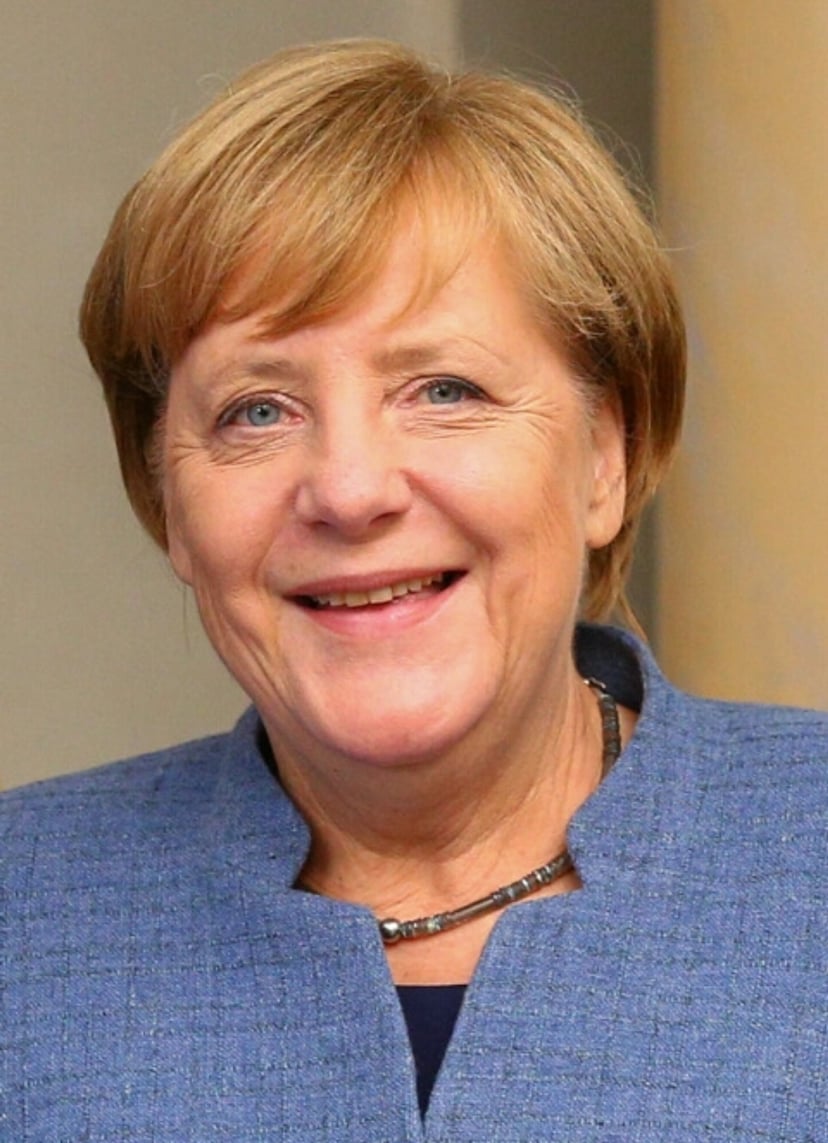
Angela Merkel

| Chancellor of Germany | |
|---|---|
| 22 November 2005 | |
| President | |
| Gerhard Schröder | |
| Leader of the Christian Democratic Union | |
| 10 April 2000 – 7 December 2018 | |
| Deputy | |
| Wolfgang Schäuble | |
| Annegret Kramp-Karrenbauer | |
| Leader of theCDU/CSU Groupin theBundestag | |
| 22 September 2002 – 21 November 2005 | |
| Deputy | Michael Glos |
| Friedrich Merz | |
| Volker Kauder | |
| General Secretary of theChristian Democratic Union | |
| 7 November 1998 – 10 April 2000 | |
| Leader | Wolfgang Schäuble |
| Peter Hintze | |
| Ruprecht Polenz | |
| Minister for the Environment, Nature Conservation and Nuclear Safety | |
| 17 November 1994 – 26 October 1998 | |
| Chancellor | Helmut Kohl |
| Klaus Töpfer | |
| Jürgen Trittin | |
| Minister for Women and Youth | |
| 18 January 1991 – 17 November 1994 | |
| Chancellor | Helmut Kohl |
| Ursula Lehr | |
| Claudia Nolte | |
| Member of theBundestag | |
| 18 January 1991 | |
| Constituency | Stralsund – Nordvorpommern – Rügen(1991–2013)Vorpommern-Rügen – Vorpommern-Greifswald I(2013–) |
| Personal details | |
| Born | |
| Political party | |
| Spouse(s) | |
| Alma mater | |
| Signature | |
Angela Dorothea Merkel (/ˈmɜːrkəl, ˈmɛərkəl/, German: [aŋˈɡeːla doʁoˈteːa ˈmɛʁkl̩];[1] née Kasner; born 17 July 1954) is a German politician serving as Chancellor of Germany since 2005. She served as the leader of the centre-right Christian Democratic Union (CDU) from 2000 to 2018.[14] Merkel has been widely described as the de facto leader of the European Union[15] and the most powerful woman in the world.[16]
Merkel was born in Hamburg in then-West Germany and moved to East Germany as an infant when her father, a Lutheran clergyman, received a pastorate in Perleberg. She obtained a doctorate in quantum chemistry in 1986 and worked as a research scientist until 1989. Merkel entered politics in the wake of the Revolutions of 1989, and briefly served as a deputy spokesperson for the first democratically elected East German Government headed by Lothar de Maizière in 1990. Following German reunification in 1990, Merkel was elected to the Bundestag for the state of Mecklenburg-Vorpommern, and has been reelected ever since. As the protégée of Chancellor Helmut Kohl, Merkel was appointed as the Federal Minister for Women and Youth in Kohl's government in 1991, and became the Federal Minister for the Environment, Nature Conservation and Nuclear Safety in 1994. After her party lost the federal election in 1998, Merkel was elected Secretary-General of the CDU before becoming the party's first female leader two years later in the aftermath of a donations scandal that toppled Wolfgang Schäuble.
Following the 2005 federal election, Merkel was appointed Germany's first female chancellor at the head of a grand coalition consisting of the CDU, its Bavarian sister party the Christian Social Union (CSU), and the Social Democratic Party of Germany (SPD). In the 2009 federal election the CDU obtained the largest share of the vote, and Merkel was able to form a coalition government with the Free Democratic Party (FDP).[17] At the 2013 federal election, Merkel's CDU won a landslide victory with 41.5% of the vote and formed a second grand coalition with the SPD, after the FDP lost all of its representation in the Bundestag.[18] After the 2017 federal election the CDU was again the largest party, and she was reelected to her fourth term on 14 March 2018.[19]
In 2007, Merkel was President of the European Council and played a central role in the negotiation of the Treaty of Lisbon and the Berlin Declaration. One of Merkel's consistent priorities has been to strengthen transatlantic economic relations. Merkel played a crucial role in managing the financial crisis at the European and international level, and she has been referred to as "the decider". In domestic policy, health care reform, problems concerning future energy development and more recently her government's approach to the ongoing migrant crisis have been major issues during her Chancellorship.[20] She has served as senior G7 leader since 2014, and previously from 2011 to 2012. In 2014 she became the longest-serving incumbent head of government in the European Union. In October 2018, Merkel announced that she would not seek reelection as leader of the CDU at the party convention in December 2018 and as Chancellor in 2021.[21]
| Chancellor of Germany | |
|---|---|
| 22 November 2005 | |
| President | |
| Gerhard Schröder | |
| Leader of the Christian Democratic Union | |
| 10 April 2000 – 7 December 2018 | |
| Deputy | |
| Wolfgang Schäuble | |
| Annegret Kramp-Karrenbauer | |
| Leader of theCDU/CSU Groupin theBundestag | |
| 22 September 2002 – 21 November 2005 | |
| Deputy | Michael Glos |
| Friedrich Merz | |
| Volker Kauder | |
| General Secretary of theChristian Democratic Union | |
| 7 November 1998 – 10 April 2000 | |
| Leader | Wolfgang Schäuble |
| Peter Hintze | |
| Ruprecht Polenz | |
| Minister for the Environment, Nature Conservation and Nuclear Safety | |
| 17 November 1994 – 26 October 1998 | |
| Chancellor | Helmut Kohl |
| Klaus Töpfer | |
| Jürgen Trittin | |
| Minister for Women and Youth | |
| 18 January 1991 – 17 November 1994 | |
| Chancellor | Helmut Kohl |
| Ursula Lehr | |
| Claudia Nolte | |
| Member of theBundestag | |
| 18 January 1991 | |
| Constituency | Stralsund – Nordvorpommern – Rügen(1991–2013)Vorpommern-Rügen – Vorpommern-Greifswald I(2013–) |
| Personal details | |
| Born | |
| Political party | |
| Spouse(s) | |
| Alma mater | |
| Signature | |
Background and early life
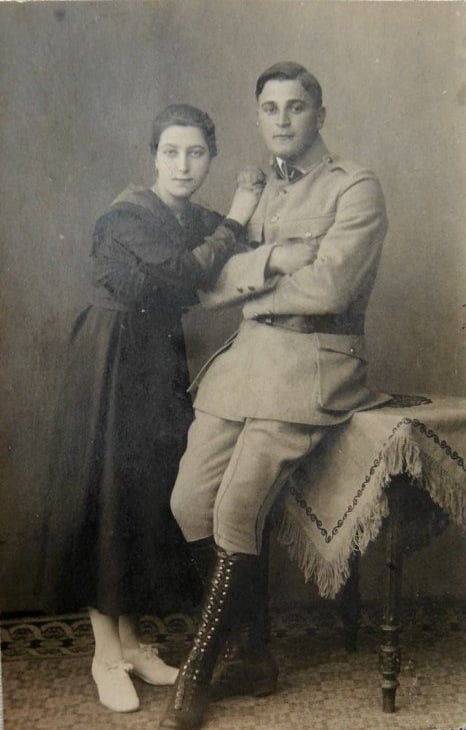
Merkel's paternal grandfather, Ludwik Marian Kaźmierczak, in Polish Blue Army uniform, and his then-fiancée Margarethe, Merkel's grandmother.
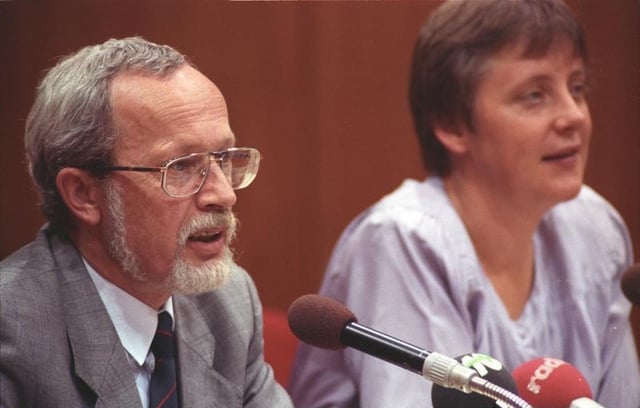
Merkel and Lothar de Maizière, 1990
Merkel was born Angela Dorothea Kasner in 1954, in Hamburg, West Germany, the daughter of Horst Kasner (1926–2011; né Kaźmierczak),[22] Jentzsch), born in Danzig (now Gdańsk, Poland), a teacher of English and Latin. She has two younger siblings, Marcus Kasner, a physicist, and Irene Kasner, an occupational therapist. In her childhood and youth, Merkel was known among her peers by the nickname "Kasi", derived from her last name Kasner.[24]
Merkel is of German and Polish descent.
Her paternal grandfather, Ludwik Kasner, was a German policeman of Polish ethnicity, who had taken part in Poland's struggle for independence in the early 20th century.[25] He married Merkel's grandmother Margarethe, a German from Berlin, and relocated to her hometown where he worked in the police. In 1930, they Germanized the Polish name Kaźmierczak to Kasner.[26][27][28][29] Merkel's maternal grandparents were the Danzig politician Willi Jentzsch, and Gertrud Alma née Drange, a daughter of the city clerk of Elbing (now Elbląg, Poland) Emil Drange. Since the mid 1990s, Merkel has publicly mentioned her Polish heritage on several occasions and described herself as a quarter Polish, but her Polish roots became better known as a result of a 2013 biography.[30]
Religion played a key role in the Kasner family's migration from West Germany to East Germany.[31] Merkel's paternal grandfather was originally Catholic but the entire family converted to Lutheranism during the childhood of her father,[27] who later studied Lutheran theology in Heidelberg and Hamburg. In 1954, when Angela was just three months old, her father received a pastorate at the church in Quitzow (a quarter of Perleberg in Brandenburg), which was then in East Germany. The family moved to Templin and Merkel grew up in the countryside 90 km (56 mi) north of East Berlin.[32]
In 1968, Merkel joined the Free German Youth (FDJ), the official communist youth movement sponsored by the ruling Marxist–Leninist Socialist Unity Party of Germany.[33][34][35] Membership was nominally voluntary, but those who did not join found it difficult to gain admission to higher education.[36] She did not participate in the secular coming of age ceremony Jugendweihe, however, which was common in East Germany. Instead, she was confirmed.[37] During this time, she participated in several compulsory courses on Marxism-Leninism with her grades only being regarded as "sufficient".[38]
Education and scientific career
Merkel was educated at Karl Marx University, Leipzig, where she studied physics from 1973 to 1978.[32] While a student, she participated in the reconstruction of the ruin of the Moritzbastei, a project students initiated to create their own club and recreation facility on campus. Such an initiative was unprecedented in the GDR of that period, and initially resisted by the University; however, with backing of the local leadership of the SED party, the project was allowed to proceed.[39] At school, she learned to speak Russian fluently, and was awarded prizes for her proficiency in Russian and Mathematics.[40]
Near the end of her studies, Merkel sought an assistant professorship at an engineering school.
As a condition for getting the job, Merkel was told she would need to agree to report on her colleagues to officers of the Ministry for State Security (Stasi). Merkel declined, using the excuse that she could not keep secrets well enough to be an effective spy.[41]
Merkel worked and studied at the Central Institute for Physical Chemistry of the Academy of Sciences in Berlin-Adlershof from 1978 to 1990. At first she and her husband squatted in Mitte.[42] At the Academy of Sciences, she became a member of its FDJ secretariat. According to her former colleagues, she openly propagated Marxism as the secretary for "Agitation and Propaganda".[43] However, Merkel has denied this claim and stated that she was secretary for culture, which involved activities like obtaining theatre tickets and organising talks by visiting Soviet authors.[44] She stated: "I can only rely on my memory, if something turns out to be different, I can live with that."[43]
After being awarded a doctorate (Dr. rer. nat.) for her thesis on quantum chemistry in 1986,[45] she worked as a researcher and published several papers.[46] In 1986, she was able to travel freely to West Germany to attend a congress; she also participated in a multi-week language course in Donetsk, in the then-Ukrainian Soviet Socialist Republic (now part of the disputed Donetsk People's Republic).[47]
Early political career
The fall of the Berlin Wall in November 1989 served as the catalyst for Merkel's political career. Although she did not participate in the crowd celebrations the night the wall came down, one month later Merkel became involved in the growing democracy movement, joining the new party Democratic Awakening.[48] Following the first (and only) multi-party election in East Germany, she became the deputy spokesperson of the new pre-unification caretaker government under Lothar de Maizière.[49] Merkel had impressed de Maiziere with her adept dealing with journalists questioning the role of a party leader, Wolfgang Schnur, as an "informal co-worker" with the homeland security services.[41][48] In April 1990, Democratic Awakening merged with the East German Christian Democratic Union, which in turn merged with its western counterpart after reunification.
In the German federal election of 1990, the first to be held following reunification, Merkel successfully stood for election to the Bundestag in the parliamentary constituency of Stralsund – Nordvorpommern – Rügen in north Mecklenburg-Vorpommern.[50] She has won re-election from this constituency (renamed, with slightly adjusted borders, Vorpommern-Rügen – Vorpommern-Greifswald I in 2003) at the seven federal elections held since then. Almost immediately following her entry into parliament, Merkel was appointed by Chancellor Helmut Kohl to serve as Minister for Women and Youth in the federal cabinet.[15][51] In 1994, she was promoted to the position of Minister for the Environment and Nuclear Safety, which gave her greater political visibility and a platform on which to build her personal political career. As one of Kohl's protégées and his youngest Cabinet Minister, she was frequently referred to by Kohl as "mein Mädchen" ("my girl").[52]
Leader of the opposition
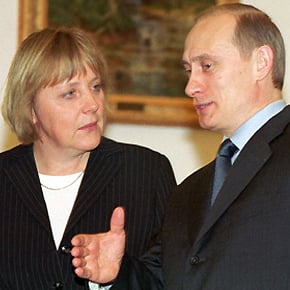
Merkel with Vladimir Putin, 2002
After the Kohl Government was defeated at the 1998 election, Merkel was appointed Secretary-General of the CDU,[51] a key position as the party was no longer part of the federal government. Merkel oversaw a string of CDU election victories in six out of seven state elections in 1999, breaking the long-standing SPD-Green hold on the Bundesrat. Following a party funding scandal that compromised many leading figures of the CDU – including Kohl himself and his successor as CDU Leader, Wolfgang Schäuble – Merkel criticised her former mentor publicly and advocated a fresh start for the party without him.[51] She was subsequently elected to replace Schäuble, becoming the first female leader of a German party on 10 April 2000.[53] Her election surprised many observers, as her personality offered a contrast to the party she had been elected to lead; Merkel is a centrist Protestant originating from predominantly Protestant northern Germany, while the CDU is a male-dominated, socially conservative party with strongholds in western and southern Germany, and its Bavarian sister party, the CSU, has deep Catholic roots.
Following Merkel's election as CDU Leader, the CDU was not able to win in subsequent state elections.
As early as February 2001 her rival Friedrich Merz had made clear he intended to become Chancellor Gerhard Schröder's main challenger in the 2002 election. Merkel's own ambition to become Chancellor was well-known, but she lacked the support of most Minister-presidents and other grandees within her own party. She was subsequently outmaneuvered politically by CSU Leader Edmund Stoiber, to whom she eventually ceded the privilege of challenging Schröder.[54] He went on to squander a large lead in opinion polls to lose the election by a razor-thin margin in an election campaign that was dominated by the Iraq War. While Chancellor Schröder made clear he would not join the war in Iraq,[55] Merkel and the CDU-CSU supported the invasion of Iraq. After Stoiber's defeat in 2002, in addition to her role as CDU Leader, Merkel became Leader of the Opposition in the Bundestag; Friedrich Merz, who had held the post prior to the 2002 election, was eased out to make way for Merkel.[56]
Merkel supported a substantial reform agenda for Germany's economic and social system, and was considered more pro-market than her own party (the CDU). She advocated German labour law changes, specifically removing barriers to laying off employees and increasing the allowed number of work hours in a week. She argued that existing laws made the country less competitive, because companies could not easily control labour costs when business is slow.[57]
Merkel argued that Germany should phase out nuclear power less quickly than the Schröder administration had planned.[58][59]
Merkel advocated a strong transatlantic partnership and German-American friendship.
In the spring of 2003, defying strong public opposition, Merkel came out in favour of the U.S. invasion of Iraq, describing it as "unavoidable" and accusing Chancellor Gerhard Schröder of anti-Americanism. She criticised the government's support for the accession of Turkey to the European Union and favoured a "privileged partnership" instead. In doing so, she reflected public opinion that grew more hostile toward Turkish membership of the European Union.[60]
2005 national election
On 30 May 2005, Merkel won the CDU/CSU nomination as challenger to Chancellor Gerhard Schröder of the SPD in the 2005 national elections. Her party began the campaign with a 21-point lead over the SPD in national opinion polls, although her personal popularity lagged behind that of the incumbent. However, the CDU/CSU campaign suffered[61] when Merkel, having made economic competence central to the CDU's platform, confused gross and net income twice during a televised debate.[62] She regained some momentum after she announced that she would appoint Paul Kirchhof, a former judge at the German Constitutional Court and leading fiscal policy expert, as Minister of Finance.[61]
Merkel and the CDU lost ground after Kirchhof proposed the introduction of a flat tax in Germany, again undermining the party's broad appeal on economic affairs and convincing many voters that the CDU's platform of deregulation was designed to benefit only the rich.[63] This was compounded by Merkel's proposal to increase VAT[64] to reduce Germany's deficit and fill the gap in revenue from a flat tax. The SPD were able to increase their support simply by pledging not to introduce flat taxes or increase VAT. Although Merkel's standing recovered after she distanced herself from Kirchhof's proposals, she remained considerably less popular than Schröder, and the CDU's lead was down to 9% on the eve of the election.[65]
On the eve of the election, Merkel was still favored to win a decisive victory based on opinion polls.[66] On 18 September 2005, Merkel's CDU/CSU and Schröder's SPD went head-to-head in the national elections, with the CDU/CSU winning 35.2% (CDU 27.8%/CSU 7.5%) of the second votes to the SPD's 34.2%.[66] The result was so close, both Schröder and Merkel claimed victory.[51][66] Neither the SPD-Green coalition nor the CDU/CSU and its preferred coalition partners, the Free Democratic Party, held enough seats to form a majority in the Bundestag.[66] A grand coalition between the CDU/CSU and SPD faced the challenge that both parties demanded the chancellorship.[66][67] However, after three weeks of negotiations, the two parties reached a deal whereby Merkel would become Chancellor and the SPD would hold 8 of the 16 seats in the cabinet.[67]
Chancellor of Germany
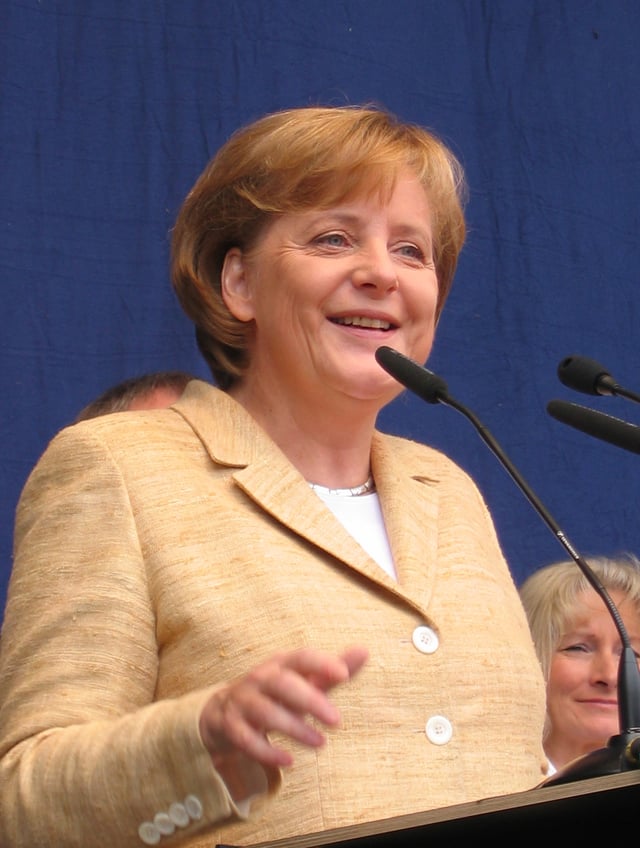
Merkel in 2007
On 22 November 2005, Merkel assumed the office of Chancellor of Germany following a stalemate election that resulted in a grand coalition with the SPD. The coalition deal was approved by both parties at party conferences on 14 November 2005.[68] Merkel was elected Chancellor by the majority of delegates (397 to 217) in the newly assembled Bundestag on 22 November 2005, but 51 members of the governing coalition voted against her.[69]
Reports at the time indicated that the grand coalition would pursue a mix of policies, some of which differed from Merkel's political platform as leader of the opposition and candidate for Chancellor.
The coalition's intent was to cut public spending whilst increasing VAT (from 16 to 19%), social insurance contributions and the top rate of income tax.[70]
When announcing the coalition agreement, Merkel stated that the main aim of her government would be to reduce unemployment, and that it was this issue on which her government would be judged.[71]
Her party was re-elected in 2009 with an increased number of seats, and could form a governing coalition with the FDP. This term was overshadowed by the European debt crisis. Conscription in Germany was abolished and the Bundeswehr became a Volunteer military. Unemployment sank below the mark of 3 million unemployed people.[72]
In the 2017 election, Merkel led her party to victory for the fourth time. Both CDU/CSU and SPD received a significantly lower proportion of the vote than they did in the 2013 election, and attempted to form a coalition with the FDP and Greens.[74][75] The collapse of these talks led to stalemate.[76] The German President Frank-Walter Steinmeier subsequently appealed successfully to the SPD to change their hard stance and to agree a 3rd grand coalition with the CDU/CSU.[77]
Domestic policy
Immigration
In October 2010, Merkel told a meeting of younger members of her conservative Christian Democratic Union (CDU) party at Potsdam that attempts to build a multicultural society in Germany had "utterly failed",[81] stating that: "The concept that we are now living side by side and are happy about it" does not work[82] and "we feel attached to the Christian concept of mankind, that is what defines us. Anyone who doesn't accept that is in the wrong place here".[83] She continued to say that immigrants should integrate and adopt Germany's culture and values. This has added to a growing debate within Germany[84] on the levels of immigration, its effect on Germany and the degree to which Muslim immigrants have integrated into German society.
Refugee and migration policy
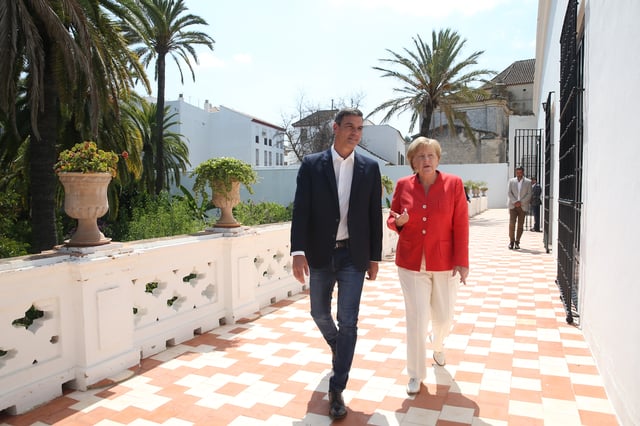
Spanish PM Sánchez and Chancellor Merkel in a meeting about migration in Andalusia, Spain in 2018
Late August 2015, Chancellor Merkel announced that Germany would also process asylum applications from Syrian refugees if they had come to Germany through other EU countries.[85] That year, nearly 1.1 million asylum seekers entered Germany.
Foreign policy
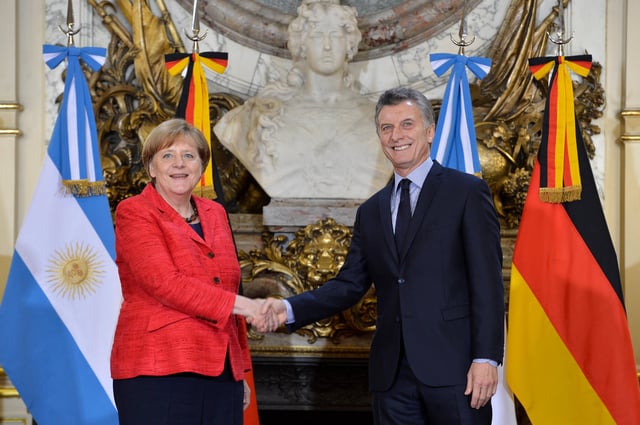
Merkel meets with Argentine President Mauricio Macri in the Casa Rosada, Buenos Aires, 2017.
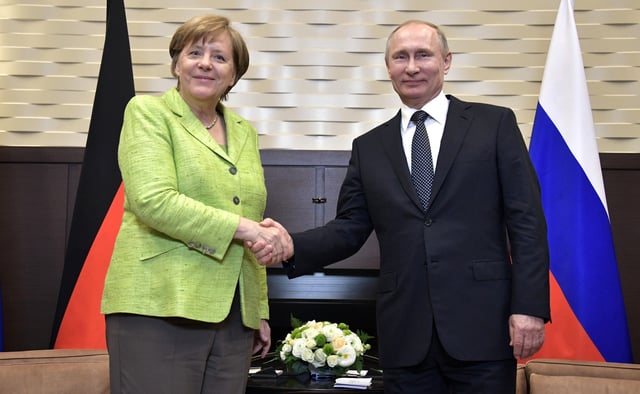
Merkel with Russian President Vladimir Putin in Sochi, Russia, May 2017
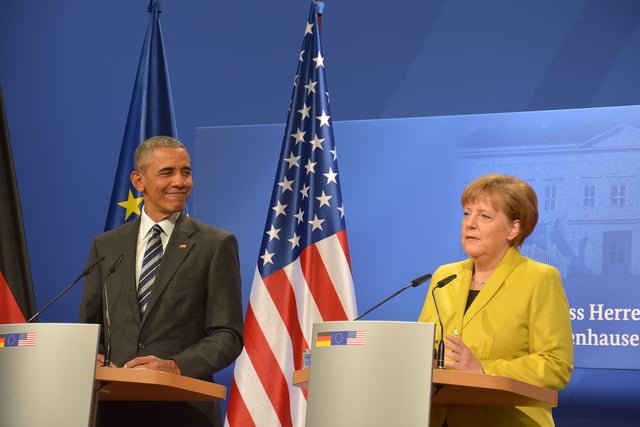
Merkel with Barack Obama in Hannover, Germany, April 2016
Merkel's foreign policy has focused on strengthening European cooperation and international trade agreements.
Merkel has been widely described as the de facto leader of the European Union throughout her tenure as Chancellor.
One of Merkel's priorities was strengthening transatlantic economic relations.
She signed the agreement for the Transatlantic Economic Council on 30 April 2007 at the White House.[89] Merkel enjoyed good relations with U.S.
Presidents George W. Bush, and Barack Obama.[90] Obama described her in 2016 as his "closest international partner" throughout his tenure as President.[91]
On 25 September 2007, Merkel met the 14th Dalai Lama for "private and informal talks" in the Chancellery in Berlin amid protest from China. China afterwards cancelled separate talks with German officials, including talks with Justice Minister Brigitte Zypries.[92]
In 2006, Merkel expressed concern about overreliance on Russian energy, but she received little support from others in Berlin.[93]
Merkel favors the Association Agreement between Ukraine and the European Union; but stated in December 2012 that its implementation depends on reforms in Ukraine.[94]
In recognition of the importance of China to the German economy, by 2014 Merkel had led seven trade delegations to China since assuming office in 2005. The same year, in March, China's President Xi Jinping visited Germany.[95]
In June 2017, Merkel criticized the draft of new U.S. sanctions against Russia that target EU–Russia energy projects, including Nord Stream 2 gas pipeline.[97]
In June 2018, Merkel said that there had been "no moral or political justification" for the post-war expulsion of ethnic Germans from Central and Eastern European countries.[98]
Eurozone crisis
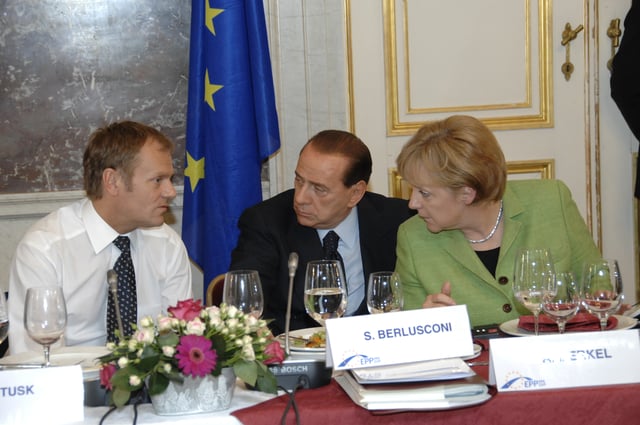
Merkel, Polish Prime Minister Donald Tusk and Italian PM Silvio Berlusconi, 2008
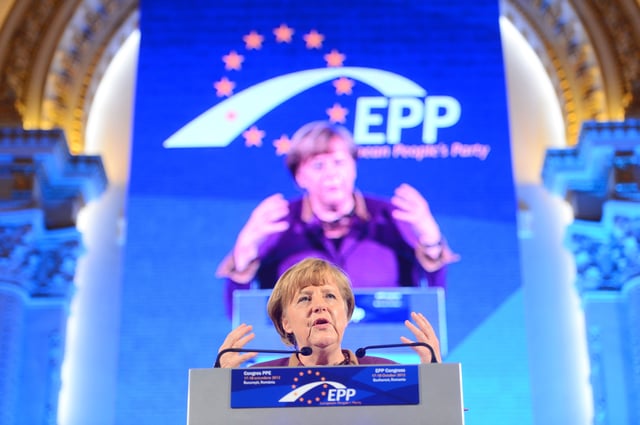
Angela Merkel at the 2012 congress of the European People's Party (EPP)
On 4 October 2008, following the Irish Government's decision to guarantee all deposits in private savings accounts, a move she strongly criticised,[100] Merkel said there were no plans for the German Government to do the same. The following day, Merkel stated that the government would guarantee private savings account deposits, after all.[101] However, two days later, on 6 October 2008, it emerged that the pledge was simply a political move that would not be backed by legislation.[102] Other European governments eventually either raised the limits or promised to guarantee savings in full.[102]
Social expenditure
At the World Economic Forum in Davos, 2013, she said that Europe had only 7% of the global population and produced only 25% of the global GDP, but that it accounted for almost 50% of global social expenditure. She went on to say that Europe could only maintain its prosperity by being innovative and measuring itself against the best.[103] Since then, this comparison has become a central element in major speeches.[104] The international financial press has widely commented on her thesis, with The Economist saying that:
If Mrs Merkel's vision is pragmatic, so too is her plan for implementing it.
It can be boiled down to three statistics, a few charts and some facts on an A4 sheet of paper.
The three figures are 7%, 25% and 50%.
Mrs Merkel never tires of saying that Europe has 7% of the world's population, 25% of its GDP and 50% of its social spending.
If the region is to prosper in competition with emerging countries, it cannot continue to be so generous.[105]
adding that:
She produces graphs of unit labour costs... at EU meetings in much the same way that the late Margaret Thatcher used to pull passages from Friedrich Hayek's Road to Serfdom from her handbag.[105]
The Financial Times
Cabinets
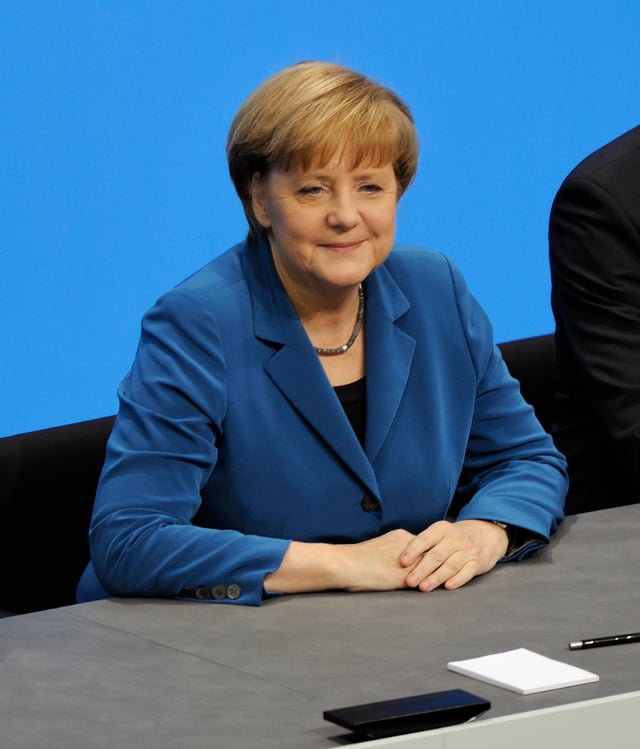
Angela Merkel at the signing of the coalition agreement for the 18th election period of the Bundestag, December 2013
The first cabinet of Angela Merkel was sworn in at 16:00 CET on 22 November 2005. On 31 October 2005, after the defeat of his favoured candidate for the position of Secretary General of the SPD, Franz Müntefering indicated that he would resign as party chairman, which he did in November. Ostensibly responding to this, Edmund Stoiber (CSU), who was originally nominated as Minister for Economics and Technology, announced his withdrawal on 1 November 2005. While this was initially seen as a blow to Merkel's attempt at forming a viable coalition, the manner in which Stoiber withdrew earned him much ridicule and severely undermined his position as a Merkel rival. Separate conferences of the CDU, CSU, and SPD approved the proposed Cabinet on 14 November 2005. The second Cabinet of Angela Merkel was sworn in on 28 October 2009.[107]
In 2013, Merkel won one of the most decisive victories in German history, achieving the best result for the CDU/CSU since reunification and coming within five seats of the first absolute majority in the Bundestag since 1957.[64] However, with their preferred coalition partner, the FDP, failing to enter parliament for the first time since 1949, the CDU/CSU turned to the SPD to form the third grand coalition in postwar German history and the second under Merkel's leadership. The third Cabinet of Angela Merkel was sworn in on 17 December 2013.[109]
Approval ratings
Midway through her second term, Merkel's approval plummeted in Germany, resulting in heavy losses in state elections for her party.[113] An August 2011 poll found her coalition had only 36% support compared to a rival potential coalition's 51%.[114] However, she scored well on her handling of the recent euro crisis (69% rated her performance as good rather than poor), and her approval rating reached an all-time high of 77% in February 2012 and again in July 2014.[115] Merkel's approval rating dropped to 54% in October 2015, during the European migrant crisis, the lowest since 2011.[116] According to a poll conducted after terror attacks in Germany Merkel's approval rating dropped to 47% (August 2016).[117] Half of Germans did not want her to serve a fourth term in office compared to 42% in favor.[118] However, according to a poll taken in October 2016, her approval rating had been found to have risen again, 54% of Germans were found to be satisfied with work of Merkel as Chancellor.[119] According to another poll taken in November 2016, 59% were to found to be in favour of a renewed Chancellor candidature of Merkel in 2017.[120] According to a poll carried out just days after the 2016 Berlin attack, in which it was asked which political leader(s) Germans trust to solve their country's problems; 56% named Merkel, 39% Seehofer (CSU), 35% Gabriel (SPD), 32% Schulz (SPD), 25% Özdemir (Greens), 20% Wagenknecht (Left party), 15% Lindner (FDP), and just 10% for Petry (AfD).[121] A YouGov survey published in late December 2017 found that just 36 percent of all respondents wanted Merkel to stay at the helm until 2021, while half of those surveyed voters called for a change at the top before the end of the legislature.[122] By 2019 this had again changed, with now 67% of Germans wanting Merkel to stay till the end of her term in 2021 and only 29% wanting her to step down earlier.[123]
International status
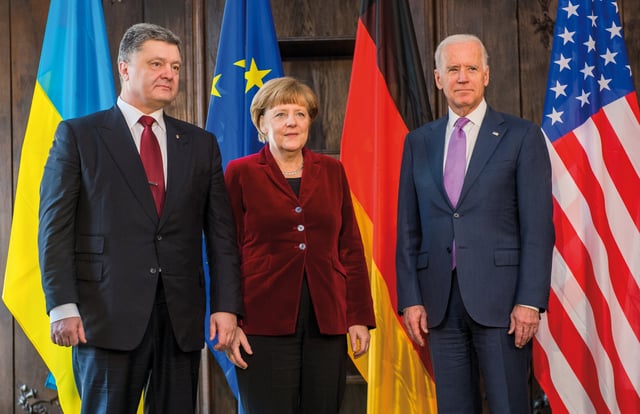
Merkel with Petro Poroshenko and Joe Biden, 7 February 2015
Merkel has been widely described as the de facto leader of the European Union throughout her tenure as Chancellor. Merkel has twice been named the world's second most powerful person following Vladimir Putin by Forbes magazine, the highest ranking ever achieved by a woman.[124][125][126][127][128] On 26 March 2014, Merkel became the longest-serving incumbent head of government in the European Union. In December 2015, Merkel was named as Time magazine's Person of the Year, with the magazine's cover declaring her to be the "Chancellor of the Free World".[129] In 2018, Merkel was named the most powerful woman in the world for a record fourteenth time by Forbes.[128] Following the election of Donald Trump to the U.S. presidency in November 2016, Merkel was described by The New York Times as "the Liberal West's Last Defender".[131] Since 2016 she has been described by some commentators as the "leader of the free world".[132][133][134][135][136] Former US Secretary of State Hillary Clinton described Merkel in 2017 as "the most important leader in the free world",[137] She is currently the senior G7 leader. The Atlantic described her in 2019 as "the world's most successful living politician, on the basis of both achievement and longevity".[138] She was found in a 2018 survey to be the most respected world leader internationally.[139] She was named as Harvard University's commencement speaker in 2019; Harvard University President Larry Bacow described her as "one of the most widely admired and broadly influential statespeople of our time".[140] Views both domestic and abroad have often been divisive and critical however, particularly of her migrant policies and attitude towards NATO contributions.[141][142][143][144][145]
Resignation plans
On 29 October 2018, Merkel announced that she would not seek reelection as leader of CDU at their party conference in December 2018, but intends to remain as chancellor until 2021, when the next German federal election, at the latest, is to be held. She stated that she does not plan to seek any political office after this. The resignations followed October setbacks for the CSU in the Bavarian state election and for the CDU in the Hessian state election.[21][146] She decided not to suggest any person as her successor as leader of the CDU.[147] However, political observers have long considered Annegret Kramp-Karrenbauer as Merkel's protégé groomed for succession. This view was confirmed when Kramp-Karrenbauer – widely seen as the chancellor's favourite for the post – was voted to succeed Merkel as leader of the CDU in December 2018.[148] Kramp-Karrenbauer's elevation to Defence Minister after Ursula von der Leyen's departure to become president of the European Commission has also boosted her standing as Merkel's most likely candidate for succession.[149] In August 2019, Merkel hinted that she might return to academia at the end of her term in 2021.[150]
Personal life
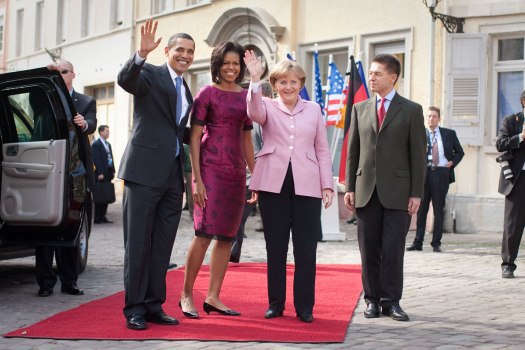
Barack Obama, Michelle Obama, Merkel, and her husband, Joachim Sauer, 2009
In 1977, at the age of 23, Merkel, then Angela Kasner, married physics student Ulrich Merkel (born 1953)[151] and took his surname.
The marriage ended in divorce in 1982.[152] Her second and current husband is quantum chemist and professor Joachim Sauer, who has largely remained out of the media spotlight. They first met in 1981,[153] became a couple later and married privately on 30 December 1998.[154] She has no children, but Sauer has two adult sons from a previous marriage.[155]
Merkel is a fervent football fan and has been known to listen to games while in the Bundestag and to attend games of the national team in her official capacity.[156][157] Merkel stated that her favorite movie is The Legend of Paul and Paula, an East German movie released in 1973.[158]
Merkel has a fear of dogs after being attacked by one in 1995.[159] Vladimir Putin, in a move reminiscent of Germany's first chancellor, brought in his Labrador Retriever during a press conference in 2007. Putin claims he did not mean to scare her, though Merkel later observed, "I understand why he has to do this – to prove he's a man.... He's afraid of his own weakness."[159]
Since 2017 Merkel has been seen and filmed to shake visibly on several public occasions, recovering shortly afterwards.[160][161][162] After one such occasion she attributed the shaking to dehydration, saying that she felt better after a drink of water.[163] After three occasions where this happened in June 2019, she began to sit down during the performances of the national anthems during the State visits of Mette Frederiksen and Maia Sandu the following month.
Religion
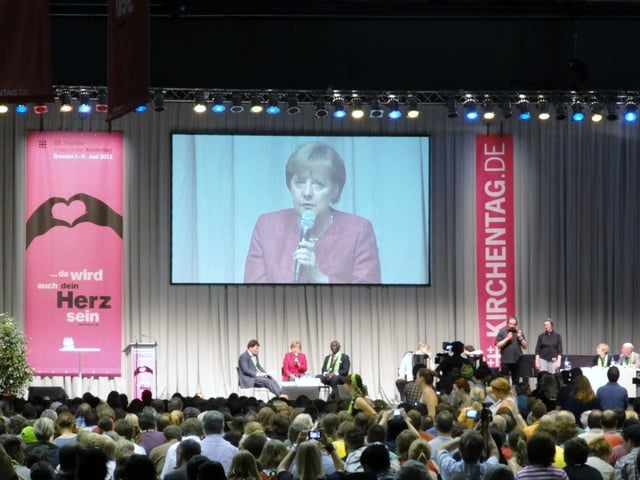
Merkel speaking at the 2011 German Evangelical Church Assembly in Dresden.
Angela Merkel is a Lutheran member of the Evangelical Church in Berlin, Brandenburg and Silesian Upper Lusatia (German: Evangelische Kirche Berlin-Brandenburg-schlesische Oberlausitz – EKBO), a United Protestant (i.e. both Reformed and Lutheran) church body under the umbrella of the Evangelical Church in Germany (EKD). The EKBO is a church of the Union of Evangelical Churches.[164] Before the 2004 merger of the Evangelical Church in Berlin-Brandenburg and the Evangelical Church in Silesian Upper Lusatia (both also being a part of the EKD), she belonged to the former. In 2012, Merkel said, regarding her faith: "I am a member of the evangelical church. I believe in God and religion is also my constant companion, and has been for the whole of my life. We as Christians should above all not be afraid of standing up for our beliefs."[165] She also publicly declared that Germany suffers not from "too much Islam" but "too little Christianity".[166]
Honours and awards
Honours
National honours
Foreign honours
Austria: Grand Decoration of Honour in Gold with Sash of the Order of Honour for Services to the Republic of Austria[168]
Bulgaria: Grand Cross of the Order of the Balkan Mountains[169][170][171]
Israel: Recipient of the President's Medal[172]
Italy: Grand Cross of the Order of Merit of the Italian Republic[173]
Lithuania: Grand Cross of the Order of Vytautas the Great[175][176]
Peru: Grand Cross of the Order of the Sun of Peru
Portugal: Grand Cross of the Order of Infante Henry
Saudi Arabia: Grand Officer of the Order of Abdulaziz al Saud
United States of America: Presidential Medal of Freedom[3][178][179]
Slovakia: 1st Class of the Order of the White Double Cross [180]
Honorary degrees
In 2007, Merkel was awarded an honorary doctorate from the Hebrew University of Jerusalem.[181]
In June 2008, she was awarded the honorary doctorate from Leipzig University.[182]
University of Technology in Wrocław (Poland) in September 2008[183] and Babeș-Bolyai University from Cluj-Napoca, Romania on 12 October 2010 for her historical contribution to the European unification and for her global role in renewing international cooperation.[184][185][186]
On 23 May 2013, she was awarded an honorary doctorate from the Radboud University Nijmegen.
In November 2013, she was awarded the Honorary Doctorate (Honoris Causa) title by the University of Szeged.
In November 2014, she was awarded the title Doctor Honoris Causa by Comenius University in Bratislava.
In September 2015, she was awarded the title Doctor Honoris Causa by the University of Bern.
In January 2017, she was awarded the title Doctor Honoris Causa jointly by the Ghent University and Katholieke Universiteit Leuven.[187]
In May 2017, Merkel was awarded the title of Doctrix Honoris Causa by the University of Helsinki.[188]
In May 2019, Merkel was awarded the honorary doctorate from Harvard University.[189]
Awards
India: Recipient of the Jawaharlal Nehru Award for International Understanding[190]
In 2006, Angela Merkel was awarded the Vision for Europe Award for her contribution toward greater European integration.
She received the Karlspreis (Charlemagne Prize) in 2008 for distinguished services to European unity.[191][192]
In March 2008, she received the B'nai B'rith Europe Award of Merit.[193]
Merkel topped Forbes magazine's list of "The World's 100 Most Powerful Women" in 2006, 2007, 2008, 2009, 2011, 2012, 2013, 2014, 2015, 2016, 2017, and 2018.[194]
New Statesman named Angela Merkel in "The World's 50 Most Influential Figures" 2010.[195]
On 16 June 2010, the American Institute for Contemporary German Studies at Johns Hopkins University in Washington D.C. awarded Chancellor Merkel its Global Leadership Award (AICGS) in recognition of her outstanding dedication to strengthening German-American relations.[196]
On 21 September 2010, the Leo Baeck Institute, a research institution in New York City devoted to the history of German-speaking Jewry, awarded Angela Merkel the Leo Baeck Medal. The medal was presented by former U.S. Secretary of the Treasury and current Director of the Jewish Museum Berlin, W. Michael Blumenthal, who cited Merkel's support of Jewish cultural life and the integration of minorities in Germany.[197]
On 31 May 2011, she received the Jawaharlal Nehru Award for the year 2009 from the Indian government. She received the award for International understanding.[198]
Forbes list of The World's Most Powerful People ranked Merkel as the world's second most powerful person in 2012, the highest ranking achieved by a woman since the list began in 2009; she was ranked fifth in 2013 and 2014
On 28 November 2012, she received the Heinz Galinski Award in Berlin, Germany.
India: Indira Gandhi Peace Prize (2013)
In December 2015, she was named Time magazine's Person of the Year.[15]
In May 2016, Merkel received in Middelburg (The Netherlands) the International Four Freedoms Award from the Roosevelt Foundation Angela Merkel – Laureate International Four Freedoms Award 2016 – Laureates since 1982 – Four Freedoms Awards [238]
For the year 2017, she received the Elie Wiesel Award, from the United States Holocaust Memorial Museum[200]
Comparisons
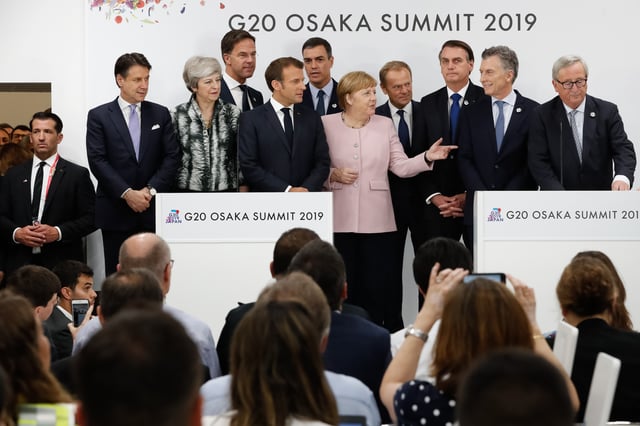
Merkel, often depicted as the unofficial leader of Europe, at the 2019 G20 Osaka summit
As a female politician from a centre right party who is also a scientist, Merkel has been compared by many in the English-language press to former British Prime Minister Margaret Thatcher (Thatcher also had a science degree from Oxford University in chemistry). Some have referred to her as "Iron Lady", "Iron Girl", and even "The Iron Frau", all alluding to Thatcher, whose nickname was "The Iron Lady". Political commentators have debated the precise extent to which their agendas are similar.[201] Later in her tenure, Merkel acquired the nickname "Mutti" (a German familiar form of "mother"). She has also been called the "Iron Chancellor", in reference to Otto von Bismarck.[202][203]
In addition to being the first female German chancellor, the first to have grown up in the former East Germany (though she was born in the West[40]
Controversies
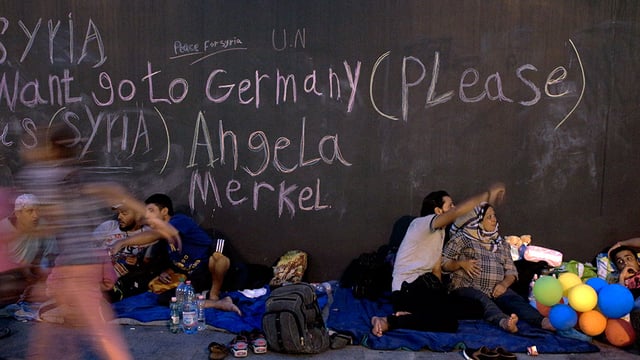
The decisions of Chancellor Angela Merkel in 2015 on migration policies have led to much discussion and commotion, in the whole Western world
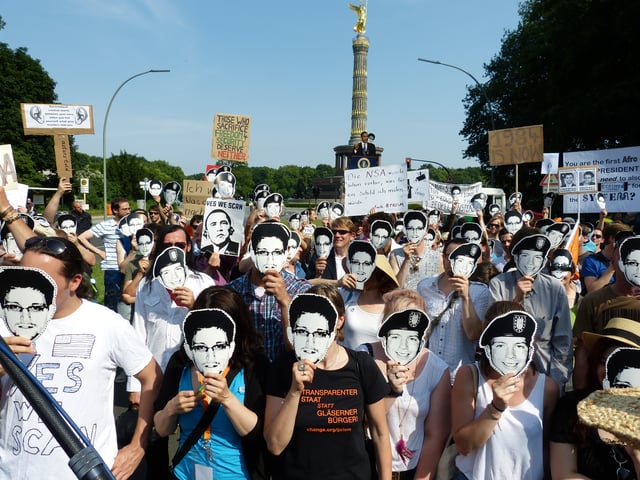
Protestors rally against NSA's mass surveillance, Berlin, June 2013

Germany's BND has covertly monitored European firms and officials at the request of the NSA.[221]
Merkel has been criticised for being personally present and involved at the M100 Media Award handover[205] to Danish cartoonist Kurt Westergaard, who had triggered the Muhammad cartoons controversy. This happened at a time of fierce emotional debate in Germany over a book by the former Deutsche Bundesbank executive and finance senator of Berlin Thilo Sarrazin, which was critical of the Muslim immigration.[206] At the same time she condemned a planned burning of Korans by a fundamental pastor in Florida.[207] The Central Council of Muslims in Germany[208][209] and the Left Party[210] (Die Linke) as well as the German Green Party[4][6] criticised the action by the centre-right chancellor. The Frankfurter Allgemeine Zeitung newspaper wrote: "This will probably be the most explosive moment of her chancellorship so far."[212] Others have praised Merkel and called it a brave and bold move for the cause of freedom of speech.
Merkel's position towards the negative statements by Thilo Sarrazin with regard to the integration problems with Arab and Turkish people in Germany has been critical throughout. According to her personal statements, Sarrazin's approach is "totally unacceptable" and counterproductive to the ongoing problems of integration.[213]
The term alternativlos (German for "without an alternative"), which was frequently used by Angela Merkel to describe her measures addressing the European sovereign-debt crisis, was named the Un-word of the Year 2010 by a jury of linguistic scholars. The wording was criticised as undemocratic, as any discussion on Merkel's politics would thus be deemed unnecessary or undesirable.[214] The expression is credited for the name of the political party Alternative for Germany, which was founded in 2013.[215]
In July 2013, Merkel defended the surveillance practices of the National Security Agency, and described the United States as "our truest ally throughout the decades".[216][217] During a visit of U.S. President Barack Obama in Berlin, Merkel said on 19 June 2013 in the context of the 2013 mass surveillance disclosures: "The Internet is uncharted territory for us all" (German: Das Internet ist für uns alle Neuland). This statement led to various internet memes and online mockery of Merkel.[218][219]
Merkel compared the NSA to the Stasi when it became known that her mobile phone was tapped by that agency. In response, Susan Rice pledged that the U.S. will desist from spying on her personally, but said there would not be a no-espionage agreement between the two countries.[220]
In July 2014 Merkel said trust between Germany and the United States could only be restored by talks between the two, and she would seek to have talks.
She reiterated the U.S. remained Germany's most important ally.[222]
Her statement "Islam is part of Germany" during a state visit of the Turkish prime minister Ahmet Davutoğlu in January 2015[223] induced criticism within her party. The parliamentary group leader Volker Kauder said that Islam is not part of Germany and that Muslims should deliberate on the question why so many violent people refer to the Quran.[224]
In October 2015, Horst Seehofer, Bavarian State Premier and leader of CSU, the sister party of Merkel's CDU, criticised Merkel's policy of allowing in hundreds of thousands of migrants from the Middle East: "We're now in a state of mind without rules, without system and without order because of a German decision."[225] Seehofer attacked Merkel policies in sharp language, threatened to sue the government in the high court, and hinted that the CSU might topple Merkel. Many MPs of Merkel's CDU party also voices dissatisfaction with Merkel.[226] Chancellor Merkel insisted that Germany has the economic strength to cope with the influx of migrants and reiterated that there is no legal maximum limit on the number of migrants Germany can take.[227]
At the conclusion of the May 2017 Group of Seven's leaders in Sicily, Merkel criticised American efforts to renege on earlier commitments on climate change. According to Merkel, the discussions were difficult and marred by dissent. "Here we have the situation where six members, or even seven if you want to add the EU, stand against one."[228]
In the arts and media
Merkel was portrayed by Swiss actress Anna Katarina in the 2012 political satire film The Dictator.[231]
Merkel features as a main character in two of the three plays that make up the Europeans Trilogy (Bruges, Antwerp, Tervuren) by Paris-based UK playwright Nick Awde: Bruges (Edinburgh Festival, 2014) and Tervuren (2016). A character named Merkel, accompanied by a sidekick called Schäuble, also appears as the sinister female henchman in Michael Paraskos's novel In Search of Sixpence.[232]
On the American sketch-comedy Saturday Night Live, she has been parodied by Kate McKinnon since 2013.[233][234][235]
On the British sketch-comedy Tracey Ullman's Show, comedian Tracey Ullman has parodied Merkel to international acclaim with German media dubbing her impersonation as the best spoof of Merkel in the world.[236]
In 2016, a documentary film Angela Merkel – The Unexpected, a story about her unexpected rise to power from an East German physicist to the most powerful woman in the world, was produced by Broadview TV and MDR in collaboration with Arte and Das Erste.[237]
See also
Willkommenskultur